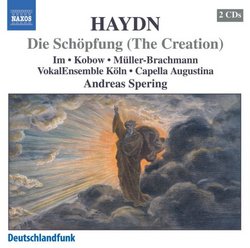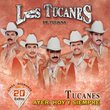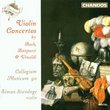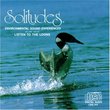| All Artists: Franz Joseph Haydn, Andreas Spering, Capella Augustina, Sunhae Im, Jan Kobow Title: Haydn: Die Schöpfung (The Creation) Members Wishing: 0 Total Copies: 0 Label: Naxos Release Date: 4/19/2005 Genre: Classical Styles: Opera & Classical Vocal, Historical Periods, Classical (c.1770-1830) Number of Discs: 2 SwapaCD Credits: 2 UPC: 747313238026 |
Search - Franz Joseph Haydn, Andreas Spering, Capella Augustina :: Haydn: Die Schöpfung (The Creation)
 | Franz Joseph Haydn, Andreas Spering, Capella Augustina Haydn: Die Schöpfung (The Creation) Genre: Classical
Format: 32 tracks, 2 Audio CDsRun Time: 104 minutesPublisher: NAXOS of AmericaISBN: 0-747313206025 |
Larger Image |
CD DetailsSynopsis
Product Description Format: 32 tracks, 2 Audio CDsRun Time: 104 minutesPublisher: NAXOS of AmericaISBN: 0-747313206025 Similar CDs
|
CD ReviewsHaydn's "Creation" on Naxos Robin Friedman | Washington, D.C. United States | 05/24/2005 (5 out of 5 stars) "Haydn's oratorio, "The Creation" is his greatest work and a masterpiece of music indeed. It receives an incandescent, inspiring performance in this recent release on Naxos - that would be a must have at any price -- by the VocalEnsembleKoln and the Capella Augustana conducted by Andreas Spering. Haydn composed "The Creation" between 1796 and 1798 following his two trips to London. During his second trip to London, Haydn heard performances of Handel oratorios in Westminister Abbey, and became greatly interested in revitalizing the form. By this time, Haydn's entire symphonic output was behind him. The work was first performed in Vienna in 1799. There are two texts, in German and in English, each regarded as equally authentic. The performance on this CD is in German. The work, simply enough, consists of three parts and tells the story of the Biblical six days of creation through the creation of Adam and Eve. The work includes three extensive solo parts for the angels Raphael (bass), Gabriel (tenor) and Uriel (soprano) with the bass and soprano doing double-duty in Part III as Adam and Eve. In discussing "The Creation", Haydn reportedly told a biographer that "since God has given me a cheerful heart, it will be pardoned me that I serve Him with a cheerful spirit." This remark captures much, but not all, of "The Creation" and of Haydn's music. Haydn's good cheer comes through in the work in the many tone-pictures he creates of the birds, and animals and works of Creation. Larks, eagles, nightingales, lions, tigers, whales, brooks, and much else are orchestrally portrayed as accompaniment to some wonderful arias and recitives. But the work is deeply inspiring and serious, particularly in the rousing choruses such as "The heavens are telling the glory of God" which concludes Part I, and the equally jubiliant finales for Parts II and III. One of the greatest moments of the work is the orchestral introduction which is Haydn's musical representation of chaos. This section is strikingly modernistic. It develops a great deal of tension and works through a number of keys as it sets the stage for the angel Rahpael to proclaim "Let there be Light" Haydn also expanded the form of the oratorio in this work by combining passages for the chorus and the soloists in a single aria -- which Handel never did. The effect is expansive and symphonic. There is a beautiful long duet for Adam and Eve near the conclusion of the work (no. 32) witnessing their joy in life and their new-found love for each other. The performers on this CD are splendid throughout. I particularly enjoyed the choruses and the lovely, light voice of soprano Sunhae Im. Tenor Jan Kobow and bass Hanno Muller-Brachmann also sing beautifully. The disc does not include a libretto, but it does have a detailed synopsis and the full text is available on the Naxos website. This is one of the most enjoyable CDs I have heard in a long while. It is a near-ideal performance of Haydn at his greatest." A wonderful new soprano, and a brilliant recording Archimedes | Pennsylvania | 03/30/2006 (5 out of 5 stars) "Run, don't walk! Persuaded by Steve Schwartz's review (on ClassM-L) of the recording of Haydn's Creation on Naxos [Soprano: Sunhae Im, Tenor: Jan Kobow, Bass: Hanno Muller-Brachmann, Vocalensemble Köln / Capella Augustina / Andreas Spering], I sent away for it, and it arrived yesterday. Well! Honestly, I have heard very few really bad recordings of the Creation; it seems to inspire everyone to do outdo themselves. Still, this recording has lots to set it apart from others that are merely excellent. To my ears, it is the soloists who really clinch the quality of any recording of the Creation. In this recording, the solists are impossible to find fault with, and the soprano is brilliant. The Soprano, Sunhae Im, has a light, confident voice that is perfect for the role, rhapsodic, worshipful, joyous or playful as the piece demands, powerful but never quite shrill. I was about to give the opinion that Ms Im should soon earn a major reputation in this repertoire, but she already has (she has performed with Hogwood, Chailly and Blomstedt). The Bass and Tenor, Messrs Muller-Brachmann and Kabow, do admirably, but I must confess that in this work I have never really noticed the other solo voices. The bass does a gorgeous job with the Great Whales, and the tenor has a beautifully expressive voice that has just the right balance of pride and delight, as he narrates how the process of creation unfolds. Ms Im did not dominate in any way; quite the opposite. The ensemble pieces--and there are several brilliant ones--are perfectly balanced. Nobody tries to outyell anyone else. As mentioned in Steve Schwartz's review, the orchestra and even the chorus, do not shrink from making sounds that would have been considered somewhat harsh a decade ago. This only adds to the overall effect; unfortunately, if you want to listen to the recording at your workplace you must have lightning-fast fingers on the volume control, because not only is the dynamic range quite wide, there are abrupt volume changes, e.g. "and there was LIGHT!" Oh mama! Wonderful tone, attack and phrasing. This Spering must be taken notice of. Summary: an excellent buy, and if you like The Creation, a must-have. Now I must go back and try to listen a little more carefully to the contralto, Christine Weir, who apparently only appears in No. 34, the last number. Talk among yourselves. Santu de Silva (Archimedes)" All sunlight and smiles--a Creation that ranks among the bes Santa Fe Listener | Santa Fe, NM USA | 05/16/2006 (5 out of 5 stars) "Maxos has become a byword in good-enough performances of masterpieces, but this Cologne-based 'Creation' is a wonderful exception. Everything about it is first-rate, and most surprising of all, the period approach yields real freshness and vibrancy--this must be the sunniest "Creation" on disc. There's not a hint of Gardiner's brash amateurishness or Harnoncourt's weird sonorities. Spering's orchestra and chorus perform with infectious joy throughout.
Better still, the vocal soloists, usually the weak link in historical performances, are excellent. The sparkling Korean soprano Sunhae Im reminds me of a young Barbara Bonney, her only failing being that she can sound a bit mechanical at times. Jan Kobow has the light timbre of most period tenors--he is cut out to be a fine Evangelist in the Bach Passions--but uses his instrument with real style, and baritone Hanno Muller-Brachmann, my favorite in the group, is bright and forward, very different from the cavernous basses one hears too often. All in all, a delightful find, especially for those of us who keep grumbling about the lack of musicality in period recordings of great Classical works." |

 Track Listings (19) - Disc #1
Track Listings (19) - Disc #1


